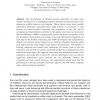Free Online Productivity Tools
i2Speak
i2Symbol
i2OCR
iTex2Img
iWeb2Print
iWeb2Shot
i2Type
iPdf2Split
iPdf2Merge
i2Bopomofo
i2Arabic
i2Style
i2Image
i2PDF
iLatex2Rtf
Sci2ools
121
Voted
ICCS
2005
Springer
2005
Springer
Self-optimization of Large Scale Wildfire Simulations
The development of efficient parallel algorithms for large scale wildfire simulations is a challenging research problem because the factors that determine wildfire behavior are complex. These factors make static parallel algorithms inefficient, especially when large number of processors is used because we cannot predict accurately the propagation of the fire and its computational requirements at runtime. In this paper, we propose an Autonomic Runtime Manager (ARM) to dynamically exploit the physics properties of the fire simulation and use them as the basis of our self-optimization algorithm. At each step of the wildfire simulation, the ARM decomposes the computational domain into several natural regions (e.g., burning, unburned, burned) where each region has the same temporal and special characteristics. The number of burning, unburned and burned cells determines the current state of the fire simulation and can then be used to accurately predict the computational power required for ea...
| Added | 27 Jun 2010 |
| Updated | 27 Jun 2010 |
| Type | Conference |
| Year | 2005 |
| Where | ICCS |
| Authors | Jingmei Yang, Huoping Chen, Salim Hariri, Manish Parashar |
Comments (0)

